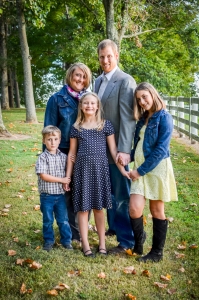For some reason, it surprises me every time it happens. At this point, it shouldn’t, because it has happened so many times, but it still does. Partly I think because I want to believe that kids are still a bit shielded from the ugliness of this world and able to maintain a certain naiveté about the realities of this life. Partly because I am not sure where they have access to current events and national ongoings, but somehow they do. And so I hear…
“Mom, have you heard about…?”
Fill it in with whatever top trending headline you’ve seen or story being passed around social media. This week, the story of the Cincinnati gorilla. Last week (thank goodness) the Chewbacca lady. The weeks before laws about bathrooms, boycotts of Target, tornados in the Midwest, and the list goes on and on and on.
And you know what my kids want to know? Not if I’ve heard about it, even if that’s what they ask. They really want to know what I think about it.
What’s my reaction? Where do I take my stand?
And they want to know that because it informs them on how they should take their stand. Our emotional reactions and ways we communicate those to our children give them a framework through which they process the world. A study released by Vanderbilt (read it here) confirms that our emotional reactions have a profound effect on how our children “turn out physically, socially, and emotionally.”
That’s pretty intense and rather all-encompassing. I mean, it’s bigger than passing on political views or personal beliefs. The way we react emotionally to what is happening around us effects more than just cognitive understanding in our kids. They don’t just want to know what we think and why. They are watching our emotional reaction.
Are we angry? Are we crying? Are we laughing?
How are we approaching those we disagree with?
What underlying attitude are our words laced with? Judgement? Empathy? Grace? Despair?
If you are like me, these realities give me pause, because I am a passionate person, and I have strong opinions and feelings about those things that top the headlines, and my tendency is to make those feelings known.
But when my daughter comes and asks me, “Mom, have you heard…?” the answer I give has far more importance than just a simple response. She’s watching me. She wants to know “What’s the right answer?”
With that in mind, here are some quick practical ways to slow the conversation down and make sure we respond with action, rather than reaction, and ensure that we are giving our kids the strongest possible chance to learn not just what we think about a particular subject, but how to approach it.
“What do you think?”
Before we tell them our thoughts on something, let them share theirs. Not only will we discover the level of understanding they have about the subject and how best to approach it with them, but we’ll also get a glimpse of their processing capabilities and preferences.
“What do you think God thinks about this?”
Again, this question helps to gauge where they are in terms of processing, but it also gives them an amazing tool to filter their own reactions through in the future. WWJD may have been trendy once, but the philosophy behind it still remains. Asking questions like these force us to slow down and consider things from a different standpoint than our own gut reactions.
“This is what I think”
Why do I put this one last? Because it is important for us to filter our answer based on the two discussions above. When we take the time to figure out where our child is emotionally and cognitively in terms of their own processing and where we both are in terms of looking at things through God’s eyes (a biblical worldview, spiritual framework, etc.), we are better able to frame our response in appropriate and non-reactive ways. Pouring out our gut reactions and emotions can be overwhelming to a child. They can leave confused, especially if they had a different take on it than their we did. Give space for them to grow (and maybe for us to grow too) by slowing down the conversation.
Proverbs 22:6 tells us if we “train up a child in the way he should go, when he is old, he won’t depart from it.” I’ve heard this quoted often in regard to passing on faith. But I think it’s deeper than that. I think we can give our kids filters through which to process the world; ways to critically approach, think about and consider the information being offered to them and pause before they react.
The researchers put it this way:
“Parents can help their children develop into emotionally stable people by giving them a supportive environment, positive feedback, role models of healthy behavior and interactions, and someone to talk to about their emotional reactions to their experiences.”
The fact that we have such a profound place of influence in the lives of our children is a blessing and a gift. My prayer is that we are able to effectively disciple our children in ways that consistently and lovingly point them to Christ, regardless of what the top trending stories are next week.
For more information about
- Kids in Worship
- Determining which Type of Family Ministry model works best for your church
- Discipleship in Intergenerational community
- Encouraging the continued conversation through Practical Discipleship at Home
- Seminars, Workshops, Coaching
Check out to ReFocus Ministry or “like” our Facebook page. Join our conversation at theReFocus Family and Intergen Ministry group on Facebook.
About the author
 Christina Embree is wife to Pastor Luke, mom to three wonderful kids, and family minister at Nicholasville UMC. She is passionate about seeing churches partnering with families to encourage faith formation at home and equipping parents to disciple their kids in the faith. Currently studying Family, Youth and Children’s Ministry at Wesley Seminary, she also blogs at www.refocusministry.org and is a contributing blogger at D6 Family, Seedbed, and ChildrensMinistryBlog.com.
Christina Embree is wife to Pastor Luke, mom to three wonderful kids, and family minister at Nicholasville UMC. She is passionate about seeing churches partnering with families to encourage faith formation at home and equipping parents to disciple their kids in the faith. Currently studying Family, Youth and Children’s Ministry at Wesley Seminary, she also blogs at www.refocusministry.org and is a contributing blogger at D6 Family, Seedbed, and ChildrensMinistryBlog.com.
